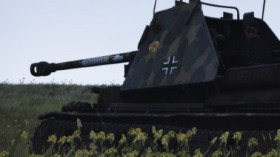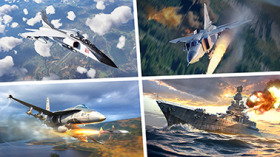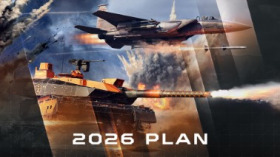
- For PC
- For MAC
- For Linux
- OS: Windows 10 (64 bit)
- Processor: Dual-Core 2.2 GHz
- Memory: 4GB
- Video Card: DirectX 11 level video card: AMD Radeon 77XX / NVIDIA GeForce GTX 660. The minimum supported resolution for the game is 720p.
- Network: Broadband Internet connection
- Hard Drive: 23.1 GB (Minimal client)
- OS: Windows 10/11 (64 bit)
- Processor: Intel Core i5 or Ryzen 5 3600 and better
- Memory: 16 GB and more
- Video Card: DirectX 11 level video card or higher and drivers: Nvidia GeForce 1060 and higher, Radeon RX 570 and higher
- Network: Broadband Internet connection
- Hard Drive: 75.9 GB (Full client)
- OS: Mac OS Big Sur 11.0 or newer
- Processor: Core i5, minimum 2.2GHz (Intel Xeon is not supported)
- Memory: 6 GB
- Video Card: Intel Iris Pro 5200 (Mac), or analog from AMD/Nvidia for Mac. Minimum supported resolution for the game is 720p with Metal support.
- Network: Broadband Internet connection
- Hard Drive: 22.1 GB (Minimal client)
- OS: Mac OS Big Sur 11.0 or newer
- Processor: Core i7 (Intel Xeon is not supported)
- Memory: 8 GB
- Video Card: Radeon Vega II or higher with Metal support.
- Network: Broadband Internet connection
- Hard Drive: 62.2 GB (Full client)
- OS: Most modern 64bit Linux distributions
- Processor: Dual-Core 2.4 GHz
- Memory: 4 GB
- Video Card: NVIDIA 660 with latest proprietary drivers (not older than 6 months) / similar AMD with latest proprietary drivers (not older than 6 months; the minimum supported resolution for the game is 720p) with Vulkan support.
- Network: Broadband Internet connection
- Hard Drive: 22.1 GB (Minimal client)
- OS: Ubuntu 20.04 64bit
- Processor: Intel Core i7
- Memory: 16 GB
- Video Card: NVIDIA 1060 with latest proprietary drivers (not older than 6 months) / similar AMD (Radeon RX 570) with latest proprietary drivers (not older than 6 months) with Vulkan support.
- Network: Broadband Internet connection
- Hard Drive: 62.2 GB (Full client)

On the 18th June 1940, after the defeat of Dunkirk, The British Prime Minister, Sir Winston Leonard Spencer Churchill gave a rousing speech to the British people, announcing:
"What General Weygand called the battle of France is over. I expect that the battle of Britain is about to begin"
Following six weeks of fighting in May and June, France yielded to the Nazi invasion. After the French armistice was signed on 22 June, Britain was the only country resisting Germany. Hitler did not particularly wish to invade Britain; after the fall of France, he assumed the British would simply surrender.
War Thunder presents special event - from September 15th 18:00 GMT (11:00 PDT) to September 16th 18:00 GMT (11:00 PDT)
Special 30% discount for XP conversion for British
and 20% discount for Tuck's Gladiator M.II premium aircraft
Hitler was therefore very surprised when Britain did not surrender. On The 16th of July, he issued 'Directive Number 16'. This authorised the detailed preparations for an invasion landing in Britain, codenamed Operation Sea lion. It stated:
"The aim of this operation is to eliminate the English motherland as a base from which war against Germany can be continued, and, if this should become unavoidable, to occupy it to the full extent".
German air superiority in the south of England was essential therefore before Hitler could contemplate an invasion, so Hermann Goering the head of the Luftwaffe, was instructed that the RAF must be "beaten down to such an extent that it can no longer muster any power of attack worth mentioning against the German crossing".

The Luftwaffe's principal fighter aircraft at that time were the Messerschmitt Bf109 and the Messerschmitt Bf110. It had a number of favoured bombers: the Dornier 17, the Junkers Ju88, the Heinkel 111, and the Junkers Ju87 (known as the 'Stuka' from Sturzkampfflugzeug, the German word for dive bomber). The RAF had the high-performance Hawker Hurricane and the unforgettable Supermarine Spitfire fighters.
Although on paper the Luftwaffe appeared to have the advantage in numbers of planes, pilots and experience, the two air forces were, in fact, evenly matched. The short range of the German planes and the fact they were fighting over enemy territory were both serious disadvantages for the Luftwaffe. The RAF also had radar (RAdio Detection And Ranging), a priceless tool for detecting incoming enemy raids.
The battle began in the middle of July and, initially, the Luftwaffe concentrated on attacking shipping in the English Channel and attacking coastal towns and defences. From the 12th of August, Goering shifted his focus to the obliteration of the Royal Air Force, attacking airfields and radar bases. Mistakenly convinced that British Fighter Command was very close to defeat, he also endeavoured to encourage air battles between fighter aircraft to decisively break British strength and Morale.
However, Goering grew increasingly frustrated by the large number of British planes that were still fighting off his viscous attacks. On the 4th of September, the Luftwaffe changed tactics again and, on Adolf Hitler's orders, unwisely set about destroying the capitol, London and other major cities.
On the evening of the 24th of August the Luftwaffe, whilst targeting London's docks, also dropped bombs on the city's financial heart and Oxford Street in the West End. This was probably not intentional, as it was in defiance of Hitler's strict instructions that central London should not be attacked. Winston Churchill was outraged and, 24 hours later, RAF Bomber Command retaliated.

Berlin was just in range for the British bombers. It could only be bombed at night during the summer when days were longer and skies clear, making it riskier for the pilots. However, on the evening of 25 August, a force of over 70 Armstrong Whitworth Whitleys, Handley Page Hampdens and Vickers Wellingtons set out for Berlin. Their principal targets were armament factories in the north of the city and Tempelhof Airport.
The ferocity of German anti-aircraft fire in Berlin forced the RAF to fly too high to aim their bombs accurately. The bombs consequently landed on fields, woods and some residential areas. Damage was slight and no-one was killed, but it was an embarrassment to Hermann Goering, the head of the Luftwaffe, who had boasted Berlin would never be bombed. The Nazi propaganda chief Joseph Goebbels was photographed inspecting the damage in a Berlin street.

American journalist William Shirer, who was based in Berlin, noted in his diary that,
"The concentration of anti-aircraft fire was the greatest I've ever witnessed. It provided a magnificent, a terrible sight. And it was strangely ineffective. Not a plane was brought down!”
Further British raids on the German capital in the following weeks caused light damage. However, on the 4th of September Hitler promised the crowd at a Berlin rally:
"When the British air force drops two or three or four thousand kilograms of bombs, then we will in one night drop 150, 230, 300 or 400 thousand kilograms - we will raze their cities to the ground".
The Blitz was about to begin.
Eleven blitz ridden, harrowing days later, on what became known as 'Battle of Britain Day', the RAF decimated the huge incoming Luftwaffe formations flying through the skies above London and the south coast of Britain.
It was now clear to Hitler that his air force had failed to gain air superiority so, on the 17th of September, he postponed his plans to invade Britain. His attention was now focused on the invasion of the Soviet Union, although the Luftwaffe continued to bomb Britain until the end of the war.
It's difficult to establish an exact figure of how many aircraft were shot down in the Battle of Britain, partly because both sides tended to exaggerate their successes and downplay their losses. However, it's estimated that between 10 July and the end of October 1940, the RAF lost around 1,023 aircraft whilst the Luftwaffe lost 1,887.

Wednesday 21 August 1940 – Sir Winston Churchill
The gratitude of every home in our island, in our Empire, and indeed throughout the world except in the abodes of the guilty goes out to the British airmen who, undaunted by odds, unweakened by their constant challenge and mortal danger, are turning the tide of world war by their prowess and their devotion.
Never in the field of human conflict was so much owed by so many to so few. All hearts go out to the fighter pilots, whose brilliant actions we see with our own eyes day after day but we must never forget that all the time, night after night, month after month, our bomber squadrons travel far into Germany, find their targets in the darkness by the highest navigational skill, aims their attacks, often under the heaviest fire, often at serious loss, with deliberate, careful precision, and inflict shattering blows upon the whole of the technical and war-making structure of the Nazi power.



